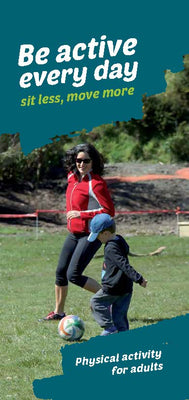Be active every day - HE2311

Information for adults on how much physical activity will help build health and well-being.
Please contact us if you would like a print-friendly PDF.
The full resource:
Sit less, move more
Physical activity for adults
Do at least 2½ hours of moderate or 1¼ hours of vigorous physical activity spread throughout the week.
Regular physical activity will help you to:
- have more energy
- lower your stress levels
- improve your posture and balance
- maintain a healthy weight
- keep bones and muscles strong and joints flexible
- feel more relaxed and sleep better
- reduce the risks of heart disease, obesity, strokes, type 2 diabetes, some cancers and depression
- live independently for longer.
For extra health benefits, aim for 5 hours of moderate or 2½ hours of vigorous physical activity spread throughout the week.
Aim for a mix of activities
Aerobic activities, such as brisk walking, swimming or dancing, will raise your heart rate and improve circulation of oxygen around the body.
Include activities to improve muscles and bone strength, such as climbing stairs, carrying shopping or children, waka ama or digging in the garden.
Aim for mainly moderate and some vigorous activities and add muscle strengthening activities at least twice a week.
Moderate
I'm breathing a bit harder, with a slightly increased heart rate.
I can hold a conversation.
- Brisk walking
- Biking on the flat
- Ballroom dancing, line dancing
- Raking the garden, trimming shrubs, hoeing
- Aqua aerobics
- Sports, for example, golf (carrying your bag), kapa haka
Vigorous
I'm breathing much harder, with a noticeably increased heart rate.
I can only say a few words without catching my breath.
- Jogging
- Biking faster than 16 km per hour
- Dance aerobics
- Heavy digging, mowing with a hand mower, splitting logs
- Fast lap swimming
- Sports, for example, netball, rugby, football, hockey
Muscle strengthening
Do muscle strengthening activities that work all 5 major muscle groups (arms, legs, chest, abdominals, back).
- Push ups, sit ups
- Carrying heavy children/shopping
- Rock climbing, weight lifting, walking or cycling uphill, swimming
- Sports like waka ama, rowing, kilikiti
Sit less, move more
- Break long periods of sitting.
- Move as much as possible during the day, for example, get off the bus early and walk, take the stairs, use housework to raise your heart rate (vacuum to music).
- You could do 30 minutes a day in 10-minute bursts.
- Walk or cycle to places in the fresh air.
- Walk children to school.
- Try out a sport or get back into one you enjoyed when younger.
- Be active with others – support will help to keep you motivated.
- Look for challenges in your area like fun walks or runs.
- Do activities you enjoy – you’re more likely to stick with them.
Find additional tips, links and resources for getting going at Physical activity
Doing some physical activity is better than doing none. What activities do you enjoy doing?
Getting started
Start slowly if you have been inactive for a long time. Build up to 2½ hours of moderate physical activity throughout the week by starting with smaller periods, for example, 5 or 10 minutes.
Talk to your doctor or nurse if it's been a long time since you were active or if you have any health problems.
Your doctor or practice nurse can also give you a Green Prescription - written advice on getting active and feeling better.
Be active safely
- Wear appropriate clothing and footwear.
- Use sunscreen and wear a hat outdoors in summer.
- Use appropriate safety gear, like helmets for cycling, buoyancy aids when kayaking and dinghy sailing, life jackets when keel boating and fishing.
- Drink enough water
At least 2½ hours per week
Related resources
Read more about food, physical activity and sleep advice for adults in:
Healthy eating, active living - HE1518 - HealthEd
Eat healthy food and move more every day - HE1333 - HealthEd
For 5-17 year olds:
Sit less, move more, sleep well - HE2312 - HealthEd
For adults aged over 65 years:
Ageing well: How to be the best you can be - HE1148 - HealthEd
Additional information
- Health New Zealand
Physical activity
- Green Prescriptions
Green Prescriptions – Health New Zealand | Te Whatu Ora
Green Prescriptions
- New Zealand Physical Activity Guidelines
Eating and activity guidelines – Health New Zealand | Te Whatu Ora
- Sport New Zealand - Ihi Aotearoa
Sport New Zealand - Ihi Aotearoa